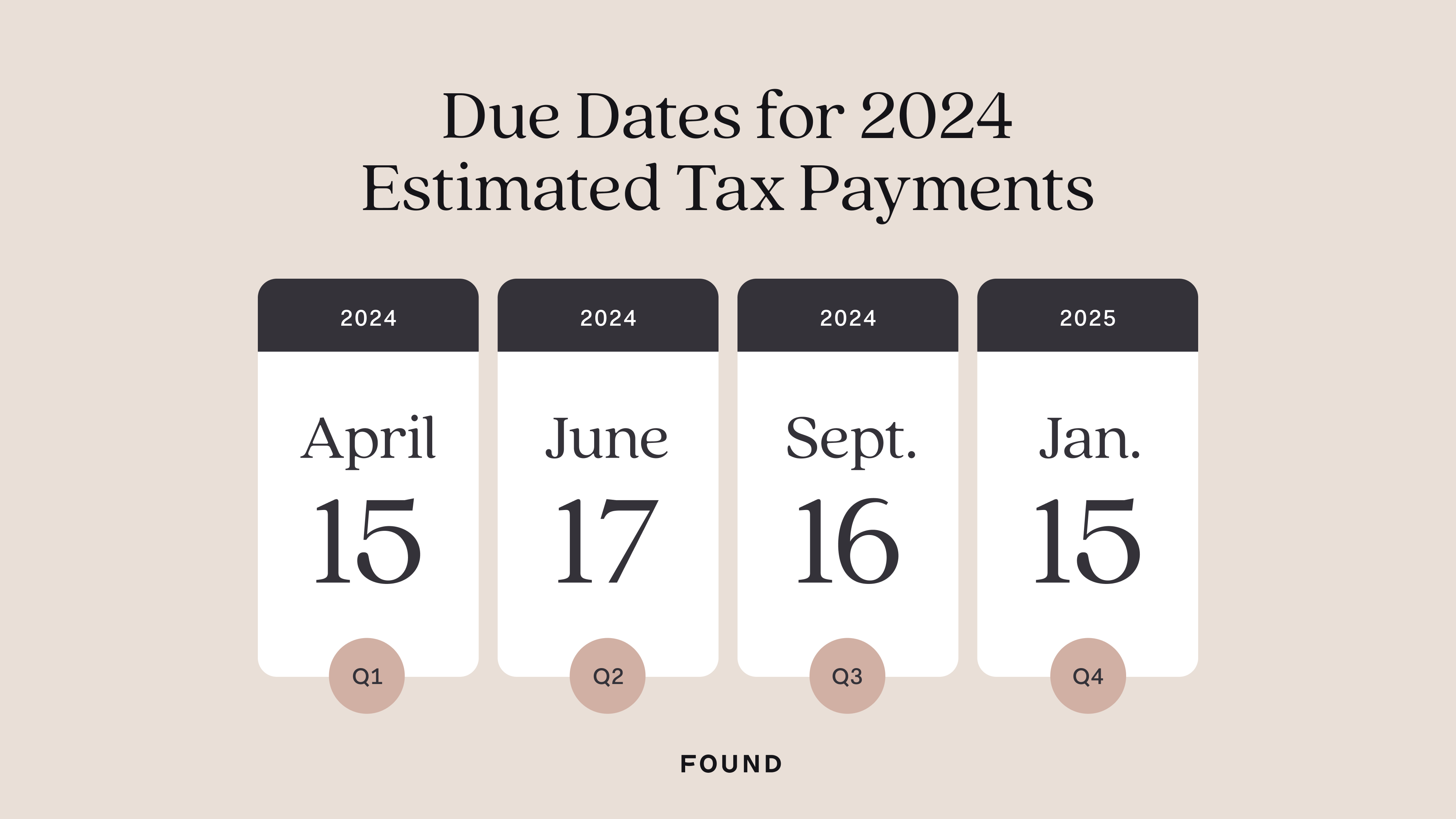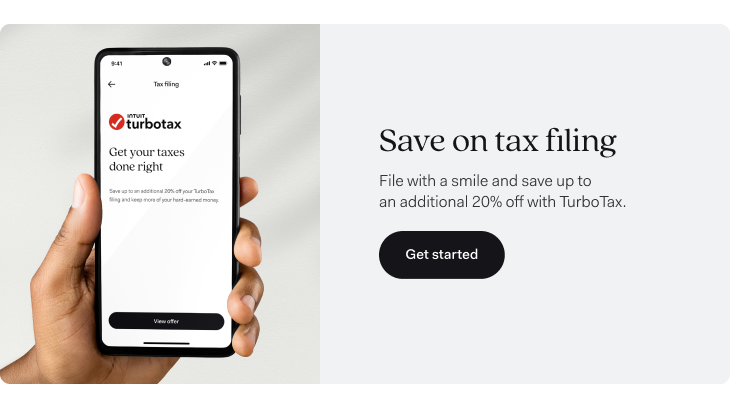2024 Tax Deadlines for the Self Employed

Surprises may be welcome when it comes to gifts or parties—but when it comes to taxes, most of us want to know what to expect well before the refund comes back. For self-employed individuals, the tax-time surprise can sometimes feel like it comes with the territory since it can be tough to stay on top of everything without a traditional employer to help guide you. But one piece of the puzzle that should help the self-employed rest a little bit easier is knowing what to do and when to do it.
From filing federal income taxes to paying estimated taxes and registering for self-employment taxes, staying on top of these deadlines will prevent last-minute panic. So get your pen and planners ready, and mark down these 2024 tax deadlines that every self-employed person needs to know.
Important 2024 Tax Dates for Self-Employed Individuals:
Before we dive in, here’s one important thing to know about dates: The taxes you will file in 2024 are for the income you earned in 2023.
Staying on top of self-employed tax deadlines is crucial to avoid penalties or fines. Mark these key dates in your calendar:
January 16, 2024: 2023 fourth quarter estimated tax payment is due
January 29, 2024: The 2023 tax filing season kicks off
January 31, 2024: Deadline to issue 2023 1099 contractor forms
April 15, 2024: Deadline to file your 2023 personal tax return (or an extension).
April 15, 2024: First quarter estimated tax payment is due
April 15, 2024: Last day to make 2023 retirement contributions
June 17, 2024: Second quarter estimated tax payment is due
September 16, 2024: Third quarter estimated tax payment is due
October 15, 2024: Deadline to file your extended 2023 personal tax return
January 15, 2025: Fourth quarter estimated tax payment is due
2024 Tax Season Kick-Off
January 16, 2024: You may be tempted to think you have a break until tax season really kicks off, but your final quarterly estimated tax payment for the 2023 calendar year is due by January 16, 2024.
January 29, 2024: The IRS typically starts processing submitted tax returns in the last week of January. For the 2023 tax season, January 29, 2024, is when the agency will begin accepting and processing 2023 tax year returns.
If you’re expecting a refund, you still won’t get your refund until approximately three weeks after your return is processed. So, if you’re filing early to get your refund, you should still factor in the processing time.
1099 Contractor Forms
January 31, 2024: This is the last date to issue 1099-NEC and 1099-K forms. Many small business owners use 1099 contractors and freelancers to support their businesses.
If you hired a freelancer in 2023, you’re required to issue a 1099-NEC form to each contractor who earned more than $600.
If you were paid more than $600 as a freelancer in 2023, you should expect to receive a 1099-NEC or 1099-K from a client or employer. Remember: January 31, 2024 is the last day for payers to postmark these forms, so even if you haven’t received yours by the 31st, it may still be on the way to you.
Starting with the 2023 tax year (this year), the IRS lowered the reporting threshold for 1099-K forms and will include payments for goods and services made on peer-to-peer apps like Venmo, Cash App, and PayPal in the 1099-K filing requirements.
It’s important to wait to file your tax return until you’ve received these documents, even if you’ve been keeping track of your income throughout the year. Why? The IRS also gets a copy of any 1099s issued to you, so you must ensure the income reported on your 1099 forms matches the income in your tax return. If there are any discrepancies, you’ll want to sort those out with the payer before you submit your return.
2024 Quarterly Estimated Tax Payments Due Dates
Quarterly taxes—or “estimated taxes”—are tax payments that self-employed individuals may be required to pay throughout the year if they receive income that doesn’t have taxes already withheld from it.
For estimated tax purposes, a year has four payment periods, and taxpayers must make a payment each quarter. For most people, the due date for the first quarterly payment is April 15. The following payments are due June 15 and September 15, with the last quarter’s payment due on January 15 of the following year. However, the deadline is the next business day if these dates fall on a weekend or holiday, as they do in the 2024 calendar year.
Here are the 2024 tax deadlines for quarterly estimated tax payments:
April 15, 2024: First quarter estimated tax payment for is due for income earned in Q1 2024
June 17, 2024: Second quarter estimated tax payment is due for income earned in Q2 2024
September 16, 2024: Third quarter estimated tax payment is due for income earned in Q3 2024
January 15, 2025: Fourth quarter estimated tax payment is due for income earned in Q4 2024
Paying your taxes through Found makes your quarterly federal tax payments a breeze. Use Found’s tax estimate feature to understand how much you owe and use the separate tax account feature to set money aside. When the quarterly tax payment deadline comes around, Found Plus will let you pay your federal taxes directly from the app.
Taxes Due (2023 tax season)
April 15, 2024: 2023 taxes are due on April 15, 2024. The tax deadline typically falls on April 15 each calendar year unless it falls on a weekend or holiday.
Need more time to prepare your individual tax return? You can file for an extension of time to file to buy a few extra months to prepare your federal taxes. Filing for an extension gives you until October 15 (or the next business day) to file a return.
If you are planning to file for an extension, here are some important things to know:
An extension of time to file your return does not grant you any extension to pay your taxes.
In order to determine how much you owe, you need to estimate the amount of taxes you owe and pay that amount to avoid any late payment penalties. If you end up owing more, you’ll have to pay additional taxes when you file. If you end up owing less, you may receive a refund.
You must file your extension request by the regular due date of your return.
Note: The IRS often extends filing deadlines for taxpayers affected by disaster situations. Visit the agency’s website to see if you are eligible.

Restrictions may apply, see TurboTax terms.
2023 Retirement Contributions
April 15, 2024: If you plan to make any contributions to your traditional or Roth individual retirement accounts (IRAs) for the 2023 tax year, today is your deadline! The IRS regularly assesses the contribution limits for retirement accounts to ensure they keep up with inflation, and while they don’t increase annually, most of them increased in 2023.
Extended Filing Deadline
October 15, 2024: If you’ve requested an extension on filing your tax return, this is the deadline to file your extended 2024 tax return. If you miss this deadline, your late filing penalties will start to accrue.
Stay on top of your taxes
The more organized you are with your tax records, the easier it will be to manage your business finances and keep up with tax deadlines. Here are a few things you can start doing now to be ready for tax season:
Separate your business and personal expenses separate from one another. If you haven’t done so, set up a separate business bank account to streamline your business operations and save you time and hassle come tax season.
Track your business transactions in a bookkeeping system to make sure you’re as quickly and efficiently as possible. Found is a great option to keep your business records organized and IRS-ready.
Set aside money for taxes throughout the year to cover the taxes you will owe.
Found’s tax tools help you run your business with newfound clarity and ease. With Found, you can auto-save for taxes, see your tax estimate in real time, find and track write-offs, and pay estimated taxes from the app. Sign up for free today.
Frequently Asked Questions about Tax Deadlines
When is the last day to file taxes?
The standard deadline to file your 2023 individual tax return is Monday, April 15, 2024. If you need an extension, you must file for one by April 15, 2024, and you’ll have until October 15, 2024 to file. However, any taxes owed are still due by April 15th to avoid penalties and interest.
What happens if I miss the quarterly estimated tax payment deadline?
If you miss a quarterly estimated tax payment deadline, you will likely owe a “late payment” penalty—a monthly penalty of .5% of any owed tax that you failed to pay—for every month you’re late. Late payment penalties accrue over time, and are capped at 25% of your total owed tax. The sooner you pay any shortfall, the lower the penalty will be. However, you may be able to avoid the underpayment penalty if you meet certain criteria, such as owing less than $1,000 in total for the year, or if your payments equal at least 90% of your current year's tax liability or 100% of the previous year's tax liability.
When are 1099s due in 2024?
The deadline for businesses to issue 1099-NEC forms to contractors and 1099-K forms for third-party payment transactions is January 31, 2024.
This means if you paid a contractor $600 or more in 2023, you need to issue them a 1099-NEC by January 31, 2024. Similarly, third-party payment processors like PayPal must issue 1099-K forms by this date for accounts that fall within the new reporting threshold requirements. As a self-employed individual, you should wait to file your tax return until you've received all your 1099 forms to ensure your reported income matches.
Disclaimer: The information on this website is not intended to provide, and should not be relied on, for tax advice. Found partners with TurboTax, and is not a filing service. Restrictions may apply, see TurboTax terms.
Related Guides

Guide to Quarterly Self-Employed Taxes
Accounting and TaxesThe Ultimate Guide to Self-Employment Taxes
Accounting and Taxes
What to Do if You File Taxes Late or Miss The Tax Deadline
Accounting and Taxesfor the self-employed
*Found is a financial technology company, not a bank. Banking services are provided by Piermont Bank, Member FDIC. The funds in your account are FDIC-insured up to $250,000 per depositor for each account ownership category.
The Found Mastercard Business debit card is issued by Piermont Bank pursuant to a license from Mastercard Inc.
The information on this website is not intended to provide, and should not be relied on, for tax advice.
Direct deposit funds may be available for use for up to two days before the scheduled payment date. Early availability is not guaranteed.
